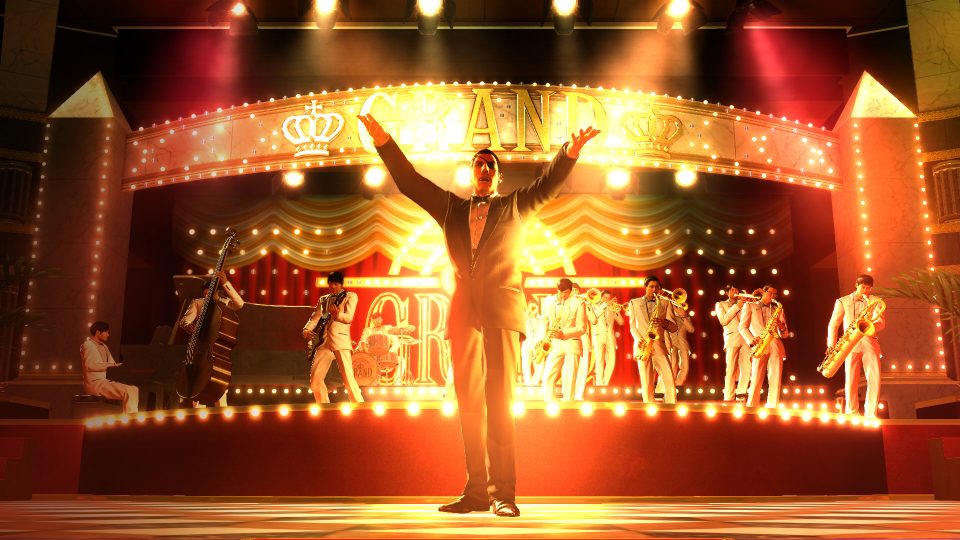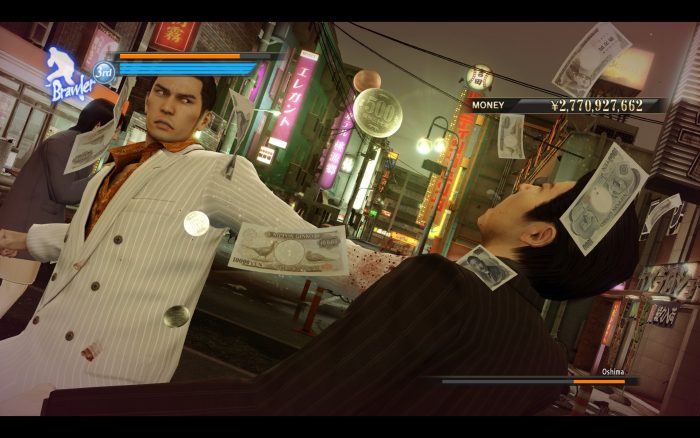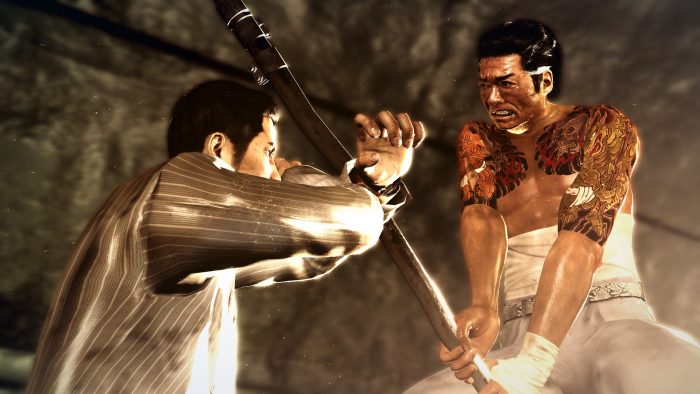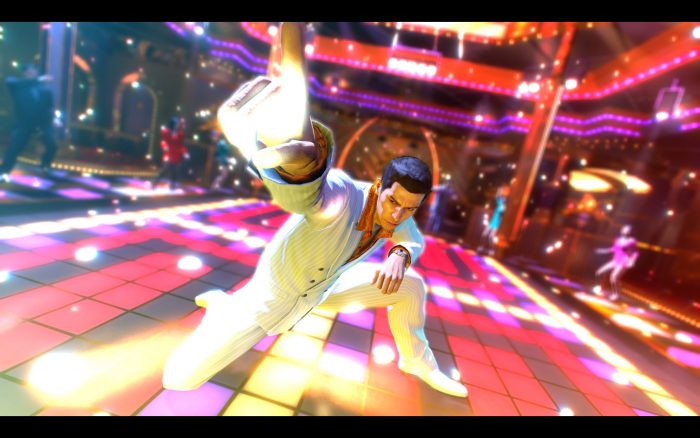Period pieces can be tricky to pull off in any form of media, let alone video games. No matter how accurately creators try to recreate the past, there is almost always a modern sensibility that somehow sneaks in, coloring the past they’re trying to portray faithfully. Ah, but when it’s pulled off correctly, it can feel like you’re literally traveling back in time. That’s the experience you get with Yakuza 0, the prequel in Sega’s long-running Yakuza series.
The Tojo Clan is in crisis! The year is 1988. After Kazuma Kiryu, a low-level enforcer for the Dojima family, is framed for murder, he finds himself drawn into a fight over the sale of a tiny piece of land that will determine which yakuza family controls Kamurocho, Tokyo. Meanwhile in Sōtenbori, Osaka, Goro Majima is the celebrated manager of the most popular cabaret club in town, The Grand. Unfortunately, all he wants is to be let back into the yakuza after being kicked out over a mistake he made a year earlier. Offered a chance to rejoin the Tojo Clan if he pulls off a successful assassination, Majima soon discovers there is more to his target than meets the eye. As the stories of these two men slowly start to converge, they uncover a conspiracy of betrayal, heartache, and family that will make them into yakuza legends and reshape the future of the Tojo clan forever.
And boy, they have a long way to go because these are definitely not the men that we met in Yakuza 1. Far from legends, they’re currently on the lowest rung of the yakuza ladder. No one knows who they are yet, and they are constantly under the thumb of more senior members of the organization. Rather than the figures of yakuza myth we know and love, here they are underdogs, raising the stakes of the story considerably.
In 1988, Kiryu, who will become a paragon of virtue within the yakuza, is little more than a brutal punk, beating up salerymen for loan sharks. He’s a decent brawler, but hasn’t yet developed his godlike fighting abilities, and is regularly confronted by characters who are just as strong, if not stronger. Watching him learn about himself and discovering what he wants out of life (in other words, becoming the Dragon of Dojima) is a joy.
The same can be said about Majima. While the pieces are all there, he hasn’t yet blossomed into the Mad Dog sociopath who warms the hearts of snakeskin fetishists everywhere. Much more restrained in his actions and manner, he’s cool, collected, and much less impulsive than his future self. There are still signs of unbalanced silliness and brutality, but those characteristics haven’t yet fully bubbled up to the surface.

In terms of gameplay…well, it’s Yakuza, with a tried-and-tested beat ’em up combat system. As you walk the streets, you get into random battles with a variety of enemies. Since the game is set during the Japanese economic bubble of the ’80s, money is used as both currency and experience points. You literally invest in yourself to learn new skills! This is a very clever twist on the classic experience points-based progression system, but it can break the game midway through when you start making billions of yen that you can use to upgrade your abilities. This results in the combat feeling a bit tedious by the endgame as you plow through dozens upon dozens of enemies with little effort required.
One of the more interesting additions to the combat (and definitely the fastest way to make money) is fights with Mr. Shakedown. There are four of these hulking characters, two for each city. When you lose a battle with one, rather than getting a game over, they take every cent of your money. The only way you can recover your cash is to find them and beat them down. Doing so provides a great return on investment, as you will also get whatever money they’ve “shaken down” from other people since your previous fight. With the right perks, you can almost double your money with every face off. The trick, of course, is that Mr. Shakedown becomes stronger after you beat him, eventually reaching insane levels of health. Trying to beat a fully upgraded Mr. Shakedown can be a remarkable challenge (especially given that they can kill you with no more than two hits).

There are three main fighting styles for each character: a fast but weak one, a slow but strong one, and a balanced one. There is also an ultimate fighting style for both characters that you get after beating their respective main side quest. Annoyingly, not all of the abilities in these powerful styles can be unlocked through EXP (or rather yen) alone; you need to get them through completion points. You normally collect a ton of CP through normal gameplay for achieving small milestones, like beating up a certain number of enemies or completing story events. The problem is that, in order to unlock the full skill tree for the ultimate combat styles, you may need to end up grinding minigames for CP, which can become irritating when you just want to play through the game.
Speaking of minigames, there is the usual crazy variety of them, including hitting balls at the batting cages, mahjong, pool, darts, and even ports of actual ’80s Sega arcade games. There is also the usual collection of hundreds of substories that range from you becoming the disco king of two cities to helping a dominatrix learn to be more assertive in sessions. Some of them are incredibly entertaining, while others are little more than fetch quests. There is also the debut of multiple minigames/substories that became staples of the series going forward, such as the pocket racing game, which was lifted almost 100% wholesale and dumped into Yakuza Kiwami, and the Cabaret Club that shows up again in Yakuza Kiwami 2. The latter in particular is a blast to play through, requiring Majima to recruit new cabaret girls and partner with local businesses to build the most popular cabaret in Sōtenbori. Kiryu’s main substory to become a real estate mogul isn’t quite as entertaining as Majima’s, but it’s at least a useful way to make a ton of money!

There’s no use mincing words about the graphics; Yakuza 0 looks like a four-year-old game developed for older hardware. It’s a perfect port of the PS4 version, which was essentially an HD version of the Japanese-only PS3 release. It doesn’t mean the game looks bad; you just need to temper your expectations if you’re more familiar with Yakuza 6 and Kiwami 2. The poor and blurry textures on clothing and objects really stand out when compared to the otherwise high-definition graphics. Most facial animation looks fantastic, but character animations are rather stiff when you aren’t in combat. There are also some quality-of-life issues that are addressed in later games. For example, the inability to save anywhere leads to annoying dashes across town to find a telephone booth to record your progress. There are very few places where the game auto-saves, so if you experience a sudden crash, you can say goodbye to whatever you’ve done since your last save.
As usual, the fictional district of Kamurocho, Tokyo looks fantastic (as does Sōtenbori, where you play as Majima). If you’ve been playing the series for years and know the streets like the back of your hand, you’ll be in for a surprise here. This is Kamurocho of 1988 before urban renewal gave the old town a facelift. Neon is everywhere, and the land that eventually becomes the Millennium Tower is occupied by a dilapidated shopping district of densely packed stores and restaurants. Everything looks and feels grittier, dirtier, and more dangerous. It’s fascinating to see the origins of the Kamurocho we know, along with the origins of Kiryu and Majima. Unfortunately, much like in previous games in the series, you can’t enter the vast majority of buildings, leaving you feeling at times like you’re wandering around a Hollywood backlot.
There is rarely anything to complain about when it comes to the sound design of the Yakuza series, and Ryu Ga Gotoku Studio really goes the extra mile here! As always, the Japanese voice acting paired with English subtitles works wonderfully, lending a sense of authenticity to the story. The voice actors give excellent performances, even if a bit of melodrama occasionally shines through (Kiryu’s best friend Nishiki, for example. Wow, that boy can cry). The music here is a cut above the rest of the series, with a much harder ’80s edge. Every one of the battle themes gets your blood pumping, especially when accompanied by the usual bone-crushing sound effects. And I can’t forget the absolutely amazing original karaoke and disco songs. Building on the rhythm game mechanics of Yakuza 5, you’re regularly going to be tearing up the dance floor to some of the hottest 80s pastiche you’ve ever heard! If you’re terrible at games like Guitar Hero, you may be in for a rough time. Otherwise, strap on your roller skates and let’s dance!

Yakuza 0 has one (technically two) of the most satisfying stories in the entire series, along with some of the best gameplay. The personal stakes are unbelievably high, the characters are well developed, and, given your grunt status in the organization, it feels much more like you are member of the yakuza. Unlike many prequels which come off as unnecessary add-ons, this feels like a natural starting point for the series. Old players will get a kick out of seeing younger versions of characters, and new players will get a perfect overview of what the Yakuza series is all about. Yakuza 0 works as a roleplaying brawler, an epic story, and a fantastic period piece. Welcome back to Kamurocho for the very first time!



